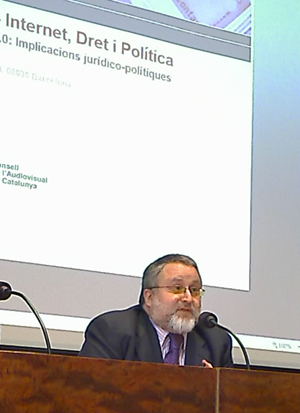Notes from the 4th Internet, Law and Politics Congress.
Session I
Opening
Eduard Aibar, Vice-President of Research, Universitat Oberta de Catalunya
Pere Fabra, Dean School of Law and Political Science, Universitat Oberta de Catalunya
Jordi Bosch, Head of the Telecommunicacions and Information Society Department, Government of Catalonia
Keynote speech
Eben Moglen
Living Apart Together: Social Networking in the Free World
Capitalism produces inherently defective technology
, mainly because of the short sightedness of the whole process. Global heating and the combustion engine being one of the most present short sightedness examples of capitalism today.
Social networking software might be at stake and be another good example of such defective technology, which will potentially cause social harm in the future as these technologies will deviate from appropriate, optimum, goals.
The Net was created with a socialist ideology: Absence of advertising, absence of surveillance, absence of tracking what one was doing (reading, writing) on the Net, a collaborative philosophy. The Wikipedia is the best example of those principles put in practice.
Social Networking Software (SNS) are tools, owned by private capital, to subvert the essence of the Net for the benefit of capitalism and its capitalists: to include advertising, to add surveillance devices, to know who read what and when, and to focus on the individual and not the community.

Eben Moglen
SNS are, technically, but content management systems (CMS), and are hence not so revolutionary neither in their concept nor in their design. Actually, all the technologies and devices used are freely available to anyone so that many other SNSs can be built at will… without the need to give away your data to the people that are now managing them.
But the fact is that web server managers are using web server logs to watch all the traces a user leaves on a web server — actually, yet another subversion of the socialist design behind the web: web server logs where intended to optimize software and bandwidth use, not for user surveillance —. And datamining is born.
So a model of you — and not a model of people, but a model of you —
is drawn each and every day. So the whole interest of capitalism in technology is to stimulate purchases and so increase sales.
So, instead of helping people get their own SNSs on their own web servers, a faustian bargain is made where “free” access to “free” software is given in exchange of personal data… and promise of future purchases. And how do you keep anything secret from anyone?
We should be aware that there is no technical need to keep on with on with this way of behaving, but just convenience, where convenience means you don’t have to think, and others are about to think about you without any restriction.
It’s just possible that in a near future, the possibility of wiping out advertising from web pages — as some web browsers are increasingly trying to — will take off. And then, the Web 2.0 hype will be over, as there’ll be no business to be done by providing “free” web spaces to everyone.
On the other hand, the actual business model of SNSs is not only challenging citizenry privacy, but also the business model of telecoms, whose business of moving along chunks of data, bits and bytes, is no more profitable, and their shift towards premium content is blocked by big media companies that do own content and are investing in alternative ways of distributing it by circumventing telecoms: SNSs.
Q&A
Me: how do we face sustainability of these desirable services if we take out ads and/or paying with our data? EM: The free software model, or the Wikipedia model can help in this. Me: but where’s the limit of volunteer responsibility and commitment? EM: It’s just that we don’t need any business model. In a socialist world, and with existing technology, we can bring good services in other ways and keeping out of the equation the gatekeepers, that insist in wanting to have “their” money.
Mónica Ariño: next step?
EM: Making people aware of the faustian bargain, of what’s been done with their lives without their consent and in constant secrecy. So, what’s the programme of the revolution?
The first step is won: free software is a real possibility. Next step is the deterioration of media control, ISPs (“the switches”) control, etc. We have to end the ownership of culture. We have to end network operators. We have to reach an advanced step of development with the ability of every citizen to send and receive information in equal conditions.
Carlos Alonso: how do we spread this ideology all over the rest of socioeconomic sectors… and in a brief period of time (not in 200 years, like the industrial revolution)? EM: There’s a good amount of products and services that are produced at a non zero cost but copied, distributed and consumed at zero cost. So the model does already work. And where products are produced at zero cost, the answer is even more valid. And if we include the long run in the equation, it does fit even better. Because, are we talking about social benefit, profit or greed?
4th Internet, Law and Politics Congress (2008)
If you need to cite this article in a formal way (i.e. for bibliographical purposes) I dare suggest:
Peña-López, I. (2008) “4th Internet, Law and Politics Congress (I). Eben Moglen: Living Apart Together: Social Networking in the Free World” In ICTlogy,
#57, June 2008. Barcelona: ICTlogy.
Retrieved month dd, yyyy from
https://ictlogy.net/review/?p=737
Previous post: Development of the Information Society: After Infrastructures, Pull Strategies
2 Comments to “4th Internet, Law and Politics Congress (I). Eben Moglen: Living Apart Together: Social Networking in the Free World” »
 RSS feed for comments on this post.
TrackBack URI
RSS feed for comments on this post.
TrackBack URI


Pingback: sinsistema » Blog Archive » De Congresos y algo más…
Pingback: Musix GNU+Linux » Blog Archive